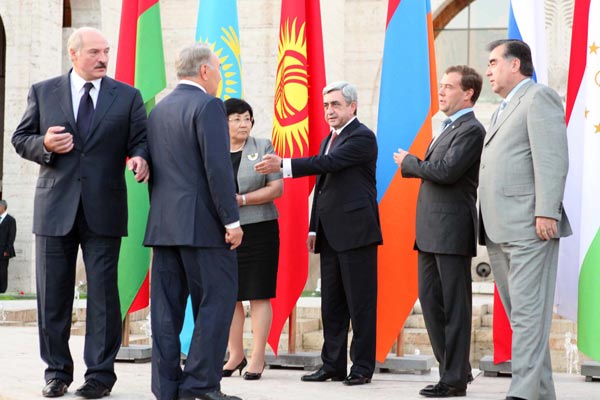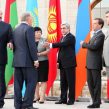
CSTO Faces Continued Divisions
Publication: Eurasia Daily Monitor Volume: 9 Issue: 21
By:

Despite continued pledges to counter security challenges in Central Asia, the Russian-led security alliance, the Collective Security Treaty Organization (CSTO), appears to face constant disagreements between member nations. The CSTO, which includes Armenia, Belarus, Kazakhstan, Kyrgyzstan, Russia, Tajikistan and Uzbekistan, is aimed at jointly facing security challenges. However, in early January disagreements between two Central Asian member states resurfaced.
On January 4, Uzbekistan cut natural gas supplies to Tajikistan without any warning. The move followed bilateral disagreements on gas prices after Uzbekistan reviewed the gas price up by $26 per thousand cubic meters (tcm), or up to $311 per tcm from November 2011. On January 5, Tajikistan’s deputy Prime Minister, Murodali Alimardon, rushed to Tashkent for urgent talks and secured Uzbekistan’s decision to resume supplies from January 6. On January 9, Tajikistan’s official news agency, Khovar, announced that both sides had settled their differences and agreed on Uzbek gas supplies to Tajikistan in 2012 totaling 200 million cubic meters (Khovar, January 9).
Relations between CSTO member countries, Uzbekistan and Tajikistan, have been uneasy in recent years. In 2001, Uzbekistan introduced a visa regime and used landmines to fortify its border with Tajikistan. A brief clash between Uzbek and Tajik border guards near Bekabad, Tashkent region, on January 2, 2012, highlighted continued bilateral tensions.
Uzbekistan left the grouping in 1999 and re-joined the CSTO in 2006. However, Tashkent has demonstrated a non-committal approach and declined to join multilateral security initiatives and joint forces of the grouping. Apart from disagreements with Tajikistan, Uzbek President Islam Karimov has long been a dissenting voice in the CSTO. During previous summit meetings, Uzbekistan refrained from signing some of the agreements. Tashkent has long insisted that the CSTO forces should be deployed only by a consensus decision, and urged that these forces must not be used to settle conflicts between the CSTO member states. Subsequently, Moscow had to clarify that the grouping would not rely on interventionist policies. On December 20, the Russian Foreign Minister, Sergei Lavrov, stated that the CSTO cannot provide any assistance to a member state without its request and consent (Interfax, December 20).
Karimov’s continued dissidence with the CSTO apparently raised doubts about Uzbekistan’s commitment to the grouping’s agenda. Not surprisingly, late last year Belarusian President Alyaksandr Lukashenka repeatedly urged the expulsion of Uzbekistan from the CSTO. Lukashenka’s idea was not discussed during the December 2011 summit in Moscow, but Minsk insisted that its suggestion should remain a matter of discussion. On December 19, the Belarusian Foreign Minister, Sergei Martynov, clarified this by saying that Minsk expected that the CSTO and Kazakhstan as its rotating president would develop Belarus’ initiatives (Interfax, December 19).
Uzbekistan has also repeatedly opposed the creation of new military bases in neighboring countries, including the international military facilities in Kyrgyzstan. Subsequently, the CSTO summit meeting last month in Moscow decided that member states can accept new military bases from the third countries only if the deployment is approved by the CSTO on a consensus basis. Kazakhstan’s President Nursultan Nazarbayev described this decision as the most important result of the summit meeting that highlighted “the unity of the organization.” President Dmitry Medvedev also hailed the decision as an important move toward “further consolidation” of the CSTO (Interfax, December 20).
Subsequently, the Kremlin Spokesperson, Nataliya Timakova, commented that Russia viewed this agreement as an additional factor of stability in Eurasia. It also demonstrated that the relations between the CSTO member states have the character of an alliance, she said (Interfax, December 20). The heads of states of the CSTO countries gathered in Moscow on December 20, 2011. The summit meeting adopted a total of 23 agreements, including a plan to counter threats from Afghanistan and an agreement on the use of the Collective Rapid Reaction Force (KSOR) (Interfax, December 20).
The KSOR currently includes some 19,000 personnel. In April 2011, the CSTO completed the formation of the Collective Peacekeeping Forces (KMS). All member states formed the force, and the KMS totals 4,200 personnel. Last December, Kazakhstan assumed the rotating presidency of the CSTO, replacing Belarus. Nonetheless, the next CSTO summit is due to convene in May 2012 in Moscow.
In December 2010, Belarus agreed to assume the rotating CSTO presidency. Since June 2009, Minsk had refused to assume the grouping’s presidency and refrained from participating in the KSOR deal amid disagreements with Moscow. Subsequently, Russia was forced to assume the CSTO’s “temporary presidency.” But in late 2010, disagreements between Russia and Belarus were solved.
In a joint statement on December 20, 2011, the CSTO leaders voiced concern about what they described as forceful intervention in the internal affairs of countries, “facing temporary difficulties.” They also expressed concern of the deteriorating security situation in Afghanistan.
The CSTO’s mention of “forceful intervention” apparently referred to the events in the Middle East, reflecting the grouping’s continued ambitions to play a larger international role.
Last year, the CSTO promised to counter a possible penetration of the “controlled chaos” from the Middle East. In April 2011, the CSTO Secretary-General, Russian general Nikolai Bordyuzha, said the CSTO could have contributed to peace-making efforts in Libya. Although the CSTO’s peace-making initiatives failed to materialize, the CSTO apparently wants a greater global role – despite the continued divisions between its member states.




